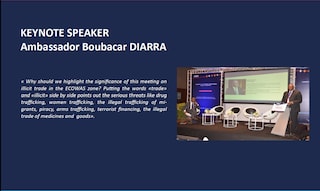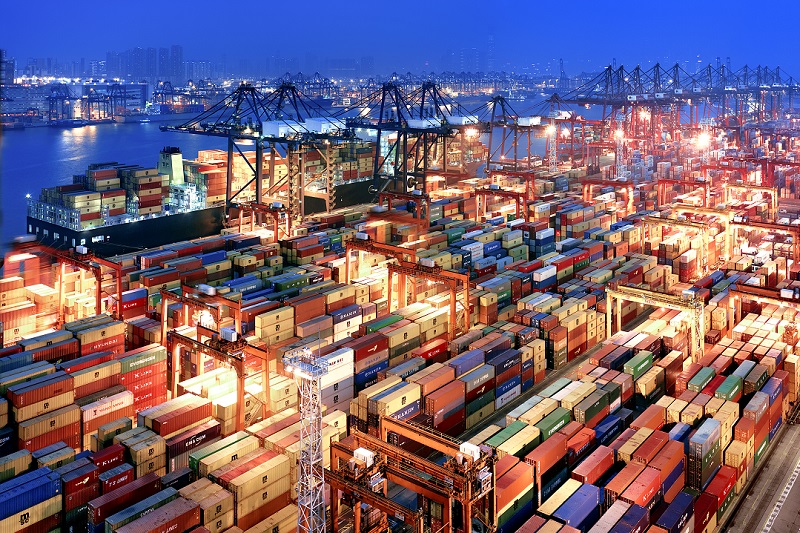
Illicit trade: West Africa’s USD 50 billion problem
14 SEP 2018

Few people know more about illicit trade in Africa than Ambassador Boubacar Diarra. Now retired, until recently he held many senior positions in the African Union. He has been the Africa Union Special Representative for the Great Lake region from 2012 to 2015 and for Somalia from 2009 to 2012. He has also been Director of the African Centre for the Study and Research on Terrorism (ACSRT).
Previously a diplomat, he was also the Ambassador of Mali in Tunisia and in charge of various governmental positions in Mali. He recently gave the keynote speech at a high-level meeting on illicit trade in the ECOWAS (Economic Community of West African states) community in Dakar. Stop Illegal spoke to him afterward.

What is the scale of the problem of illicit trade in West Africa and the ECOWAS zone?
The scale of the illicit trade phenomenon is significant in the ECOWAS zone and in West Africa, despite the many regulations adopted by countries in the region. Many factors are behind this sad fact, including:
- The porosity of borders
- Criminals exploiting the ability for free movement of people and goods within ECOWAS
- Weak economic and customs control structures
- Low penalties for traffickers and smugglers
- The very high prevalence of informal trade within the economies of the various states.
What are the main categories of illicit trade in West Africa?
Cigarette trafficking, drug trafficking, and the trafficking of goods are the main ones. Cigarette trafficking in particular represents a major revenue shortfall for state budgets.
There are lots of reasons for this. First, the absence of appropriate taxation for the importation of tobacco products, and the misuse of transit rules, where goods on their way to the final destination are diverted somewhere else. It has nasty consequences too, fueling criminal activities such as drug trafficking, trafficking in human beings, and let’s not forget financing of terrorism, thanks to the control they exercise over the economic routes used by the smugglers. Terrorists there impose levies on the smugglers in exchange for having right of way.
The operational capacity of these terrorist groups is fueled by the logistical support provided by the traffickers and the levies the former collect from the latter.
Contraband cigarettes constitute the bulk of this trafficking. But it’s not just cigarettes that make up illicit trade. Other smuggled goods include adulterated alcohol, perfume, fabrics, and other luxury items, medicines, electrical items that do not conform and that seriously threaten the health of populations, especially those with low incomes and who are forced to acquire them for lack of sufficient resources. It is estimated that 30 percent of medicines sold on the continent are counterfeit.
These products contravene hygiene and public health rules, but they are still flooding our markets. Informal street pharmacies are replacing the legal ones in many cities.
A recent report drafted with the support of OECD, the World Bank, and the African Development Bank, claimed that illicit trade in all its forms costs West Africa USD 50 billion a year. That’s more than the total amount of development aid granted to all the 15 countries in the region.
What are the links between the illicit trade and organizations like Boko Haram and Al-Shabab?
In Somalia, for example, it is well known that the Al-Shabab Movement derives much of its income from the illegal exploitation of Somali forests, including the vast Kismaayo forest. The felled trees are transformed into coal, which is then sold to the Gulf countries.
It is also true that many of the consumer products transported by ships from these countries are unloaded offshore, the products transferred onshore, and then sold duty-free in Somalia and neighboring countries. This traffic, which includes sugar and salt, provides significant resources that enable the group to maintain its operational capabilities intact.
In addition to these activities, we should add all those linked to the racketeering of traders, to the toll fees imposed on traders at numerous checkpoints set up in areas the group controls. Boko Haram does many of the same things as Al-Shabab.
Do law enforcement agencies take the illicit tobacco trade seriously enough? Are sanctions sufficient?
The level of penalties depends on the nature of the offences. Penalties generally range from one to five years’ imprisonment and high fines, in particular for provisions relating to the manufacture or importation of tobacco products, tobacco advertising, sponsorship, and other forms of advertising.
Many African countries are fighting fiercely against traffickers of all kinds who engage in illicit trade activities. For example, many countries have also adopted a system of authentication, tracking, tracing, and tax verification of manufactured and imported tobacco products based on digital marking standards for cigarettes. Significant product seizures are made.
The disparate taxation from one country to another is, as we know, one of the factors favoring the illicit cigarette trade. The absence of strict excise duty regulations is also a favorable factor. Smugglers take advantage of a country’s low tax rates to purchase large quantities of cigarettes for resale in other countries.
What is the best approach to combat illicit trade?
Illegal trade undermines state security and hampers the foundations of economic competition. It is estimated that the illicit trade on the African continent is worth more than its total development aid. It is, therefore, a major security and economic challenge, especially for economically fragile countries. I think all of the following need strengthening:
- Regulations to combat this trade in its various aspects
- The competences of law enforcement agencies in the different sectors (customs, economic affairs, tax service, magistrates, and investigating officers)
- Research, intelligence, and traceability systems within and between countries
- Partnerships between governments and civil society in the countries
- Partnerships between OECD countries and African countries in order to hopefully neutralize white-collar criminals who are very familiar with the legislation and who exploit the shortcomings of the various systems.
Related articles
Share this link
Illicit trade prevention


